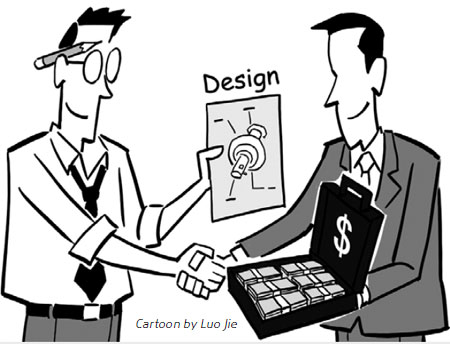


Transforming patents into profits is a challenge for China's patent holders and enterprises.
According to official statistics, China's patent technology transformation rate was a mere 10 percent last year.
Zhang Qin, deputy commissioner of the State Intellectual Property Office, said a number of major problems are hindering the transformation of Chinese patent technology into productive force.
China had the world's sixth-largest number of international patent applications in 2008, Xinhua News Agency reported. The nation filed 6,089 patent applications under the Patent Cooperation Treaty (PCT) in 2008, up 11.9 percent over previous year, according to SIPO statistics.
Around 40,500 companies submitted patent applications in 2008, a year-on-year rise of 23.9 percent.
Despite the fact that so many patent applications have been made, many of them cannot be transformed into products and profits.
Zhang Qin said: "China had a high proportion of non-service inventions, accounting for almost half of the total. Those non-service inventions are always difficult to industrialize." In some developed countries, service inventions often account for as many as 90 percent.
Globally, many big companies develop their patents after carrying out extensive market investigations, and do not need to find investors or downstream manufacturers. As a result, their patents have a high conversion rate.
"But China has so many non-service inventions, so patent holders have to deal with the implementation side on their own. Even at patent trading conferences, it is still hard to find a buyer," Zhang pointed out.
Enterprises lack the enthusiasm to implement new patent technologies. Some enterprises fail to consider their long-term strategy or patent risk conversion, while others lack the technology to carry out the transformation.
The process of turning a patent into a product is a very lengthy one. "This requires a variety of technical facilities and relative technologies, and market research should follow the process until the products enter the market. The whole program needs a system, which lots of Chinese companies are still lacking," said Zhang.
When a company decides what kind of new product it wants to research, it should not start the research immediately. There are many examples of Chinese companies' "new" products or technologies having already been invented elsewhere.
This causes difficulties when the companies go overseas and are asked to pay license fees they often can't afford.
"This is what we call 'avoiding IPR risk'. It means that before you start researching technology, you should search for similar inventions and patents all over the world. Many foreign firms have an integrated system in place to avoid IPR risks during the whole production period. "But many Chinese companies have yet to establish such systems," said Ke Xiaopeng, IPR director at ZTE.
The Shenzhen-based telecommunications equipment maker plans to invest 6 billion yuan in research and development of new technology in 2009. The company now holds more than 16,000 patents around the world, and its trademark has been registered in more than 150 countries.
Another reason for the low transfer rate is the absence of an intellectual property service system or sales agencies. Many inventors believe their inventions have good market prospects, but encounter difficulties when communicating with enterprises.
"The transfer of patents to technology is a process of venture capital investment," said Zhang, but currently there are no laws or regulations to prevent fraud during patent transformation.
Following the adoption of the latest National Intellectual Property Strategy by the State Council, China's Patent Law is undergoing amendment in order to ensure enhanced IPR protection and revamp the application process. The revised law, which will take effect on Oct 1, is expected to encourage Chinese companies to develop more high-tech patents.
(China Daily 03/02/2009 page11)













